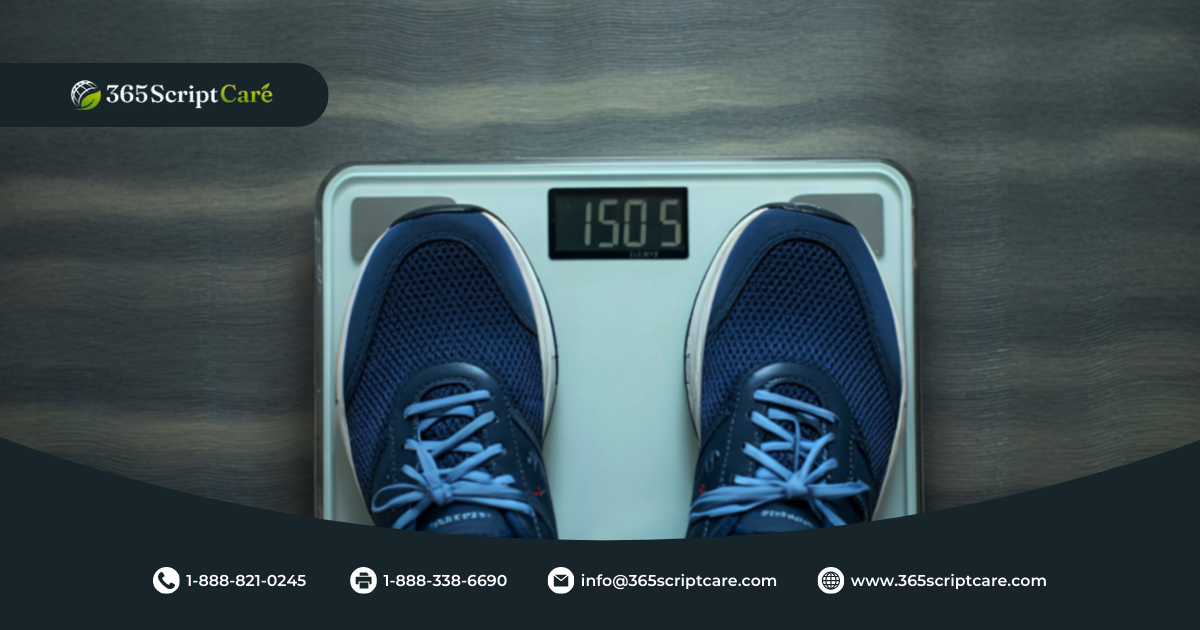Researchers and healthcare professionals are actively seeking safe and effective weight loss solutions to combat the global obesity epidemic. Semaglutide, initially designed for diabetes management, emerges as a promising development with significant weight loss potential. This article explores Semaglutide injection, unveiling its mechanisms, clinical trial outcomes, and implications for those pursuing enduring weight management. As investigations progress, Semaglutide could represent a transformative tool in the ongoing battle against obesity, offering hope for individuals seeking sustainable and evidence-based approaches to weight loss.
This blog post will explore the world of Semaglutide, understand the data, and go over the most important conclusions from the most recent research. This is important information for anyone thinking about using it to help them lose weight.
Semaglutide Overview
Semaglutide is a glucagon-like peptide-1 (GLP-1) receptor agonist, originally developed for treating type 2 diabetes. This injectable medication mimics the action of a natural hormone, GLP-1, involved in regulating blood sugar levels. Beyond its intended use, Semaglutide has garnered attention for its remarkable potential in weight management. By influencing the brain to induce feelings of fullness and slowing stomach emptying, it reduces appetite and promotes calorie reduction.
Using Semaglutide Injections to Lose Weight
Injections of Semaglutide, which were first created to treat diabetes, provide a revolutionary approach to weight loss. Semaglutide, an agonist of the glucagon-like peptide-1 (GLP-1) receptor, affects stomach emptying and appetite, leading to a decrease in caloric intake. Clinical research demonstrates the effectiveness of the STEP program, in particular, in causing significant weight loss.
For those who are battling obesity, Semaglutide is a promising option, despite some adverse effects including nausea. Regular discussions with healthcare providers should be given top priority by users to monitor any issues and solve them. Semaglutide injections stand out as a fresh and potentially revolutionary strategy in the pursuit of effective weight control, providing hope to those looking for long-term weight loss treatments.
Oral vs Injection of Semaglutide
When choosing between injectable and oral forms of semaglutide for weight management, convenience must be balanced with effectiveness. To address potential injectable aversions, oral Semaglutide offers a non-invasive approach. However, difficulties with absorption could reduce its efficacy. Subcutaneous injection of injectable Semaglutide has improved bioavailability and has shown better weight reduction outcomes in clinical trials. In making decisions, patient adherence and preference are crucial factors.
Oral Semaglutide is convenient for people who value convenience, but injectable Semaglutide seems to work better, highlighting the significance of customized strategies for achieving the best possible weight reduction results. Subsequent investigations could enhance our comprehension, directing the customized application of Semaglutide.

Semaglutide’s Effects on Weight and Appetite
Weight and hunger are two significant outcomes of semaglutide, a glucagon-like peptide-1 (GLP-1) receptor agonist that was initially created for the treatment of diabetes. Its main method consists of tricking the brain into thinking that food is full, which reduces hunger and eventually causes weight reduction.
Semaglutide delays stomach emptying by imitating the function of the hormone GLP-1, which helps reduce caloric intake overall. The efficacy of the STEP program in generating significant weight loss has been demonstrated by clinical research. Semaglutide’s twin effects on appetite regulation and stomach function make it a viable weight-management strategy in the continuous search for methods that work.
Metabolic Effects of Semaglutide
Semaglutide, a glucagon-like peptide-1 (GLP-1) receptor agonist initially developed for diabetes management, exerts notable metabolic effects beyond glycemic control. Its primary impact lies in influencing appetite and promoting weight loss. Semaglutide mimics the action of GLP-1, inducing feelings of fullness and slowing stomach emptying, resulting in reduced calorie intake. This dual mechanism not only aids in weight management but also addresses key factors in metabolic health. Clinical trials, such as the STEP program, demonstrate its effectiveness in achieving significant weight loss.
When to Take Semaglutide to Lose Weight
Semaglutide, a glucagon-like peptide-1 (GLP-1) receptor agonist initially developed for diabetes management, exerts notable metabolic effects beyond glycemic control. Its primary impact lies in influencing appetite and promoting weight loss. Semaglutide mimics the action of GLP-1, inducing feelings of fullness and slowing stomach emptying, resulting in reduced calorie intake.
This dual mechanism not only aids in weight management but also addresses key factors in metabolic health. Clinical trials, such as the STEP program, demonstrate its effectiveness in achieving significant weight loss.
Study Safety and Adverse Effects
The safety profile of Semaglutide has been a focal point in various clinical studies, shedding light on potential adverse effects associated with its use. While Semaglutide has shown efficacy in weight management and glycemic control, it is not without consideration.
Common adverse effects reported in clinical trials include nausea, vomiting, and diarrhea. These side effects are typically transient and tend to diminish over time as the body adjusts to the medication. Nonetheless, they remain important considerations for both healthcare providers and individuals considering Semaglutide for weight loss.
Beyond gastrointestinal effects, there have been observations of mild increases in heart rate associated with Semaglutide use. While these increases are generally small, the implications for cardiovascular health require careful monitoring, especially in individuals with pre-existing cardiovascular conditions.

Bariatric Surgery vs. Semaglutide
For weight management, a person may decide to use Semaglutide or bariatric surgery depending on their unique circumstances. Even though bariatric surgery is quite beneficial, there are hazards associated with the procedure and changes to the digestive tract. By suppressing hunger and encouraging weight loss, however, the injectable drug semaglutide provides a non-invasive alternative.
While surgery yields quick results, Semaglutide offers a prescription substitute that requires continuous medication. Patient preferences, health considerations, and the intended rate of weight loss are deciding factors. A customized strategy that weighs the advantages and disadvantages of options guarantees that people make decisions based on their unique requirements and circumstances.
Semaglutide in Comparison to Other Weight Loss Drugs
When comparing Semaglutide to other weight loss drugs, several factors should be considered, including efficacy, safety, side effects, and individual patient characteristics. Some other medications used for weight loss include:
- Orlistat: This medication works by preventing the absorption of dietary fat in the intestines. It is available over-the-counter and as a prescription.
- Phentermine-Topiramate: This is a combination medication that works by reducing appetite and increasing feelings of fullness. It’s approved for long-term use in certain individuals.
- Liraglutide: Another GLP-1 receptor agonist, similar to Semaglutide, liraglutide has been used for weight loss in addition to its primary use in diabetes management.
- Naltrexone-Bupropion: This combination medications affects the areas of the brain that control food intake and energy balance. It’s approved for long-term use.
Comparing these medications involves looking at clinical trial data, including the percentage of weight loss achieved, changes in metabolic parameters, and the occurrence of side effects. Individual patient characteristics, such as medical history and preferences, also play a role in determining the most suitable option.
Semaglutide (Wegovy) Side Effects for Losing Weight
Semaglutide, marketed as Wegovy for weight loss, may cause common side effects like nausea, vomiting, diarrhea, and abdominal pain, which often diminish with time. Serious side effects include pancreatitis and gallbladder disease. As with other GLP-1 receptor agonists, cardiovascular concerns such as increased heart rate may occur. Individuals with a history of cardiovascular issues should exercise caution. Regular medical monitoring is essential. Wegovy’s approval was based on clinical trials demonstrating efficacy, but individual responses vary.
Taking Into Account Individuals with Particular Medical Conditions
Individuals with specific health conditions should exercise caution when considering the use of medications like semaglutide (Wegovy) for weight loss.
- Cardiovascular Issues: People with a history of cardiovascular problems should be cautious, as some GLP-1 receptor agonists, including semaglutide, may lead to an increased heart rate.
- Pancreatitis: Individuals with a history of pancreatitis should avoid Semaglutide, as it may increase the risk of pancreatitis.
- Gallbladder Disease: Those with a history of gallbladder disease may be at an increased risk, and careful consideration is needed before using Semaglutide.
- Gastrointestinal Issues: Semaglutide commonly causes gastrointestinal side effects such as nausea and diarrhea, which might be problematic for individuals with certain gastrointestinal conditions.
- Pregnancy and Breastfeeding: The safety of Semaglutide during pregnancy and breastfeeding is not well-established, and caution is advised.
- Liver or Kidney Impairment: Individuals with liver or kidney issues may require dosage adjustments or careful monitoring due to potential impacts on drug metabolism.
- Other Medications: Semaglutide’s interactions with other medications should be considered, especially in individuals taking multiple drugs for different health conditions.
Before initiating Wegovy or any weight loss medication, individuals should have a thorough discussion with their healthcare provider. Personalized considerations based on an individual’s health history, medications, and overall health are essential to determine the suitability of semaglutide for weight loss.
Final Thoughts
Research on Semaglutide injection for weight loss demonstrates promising outcomes, with clinical trials showing significant reductions in body weight. As a GLP-1 receptor agonist, semaglutide’s mechanism of action involves appetite suppression and improved glycemic control. While it exhibits efficacy in aiding weight loss, individuals considering its use should be mindful of potential side effects, including gastrointestinal symptoms and, in rare cases, serious conditions like pancreatitis and gallbladder disease. Cheap Semaglutide is available through 365 Script Care



